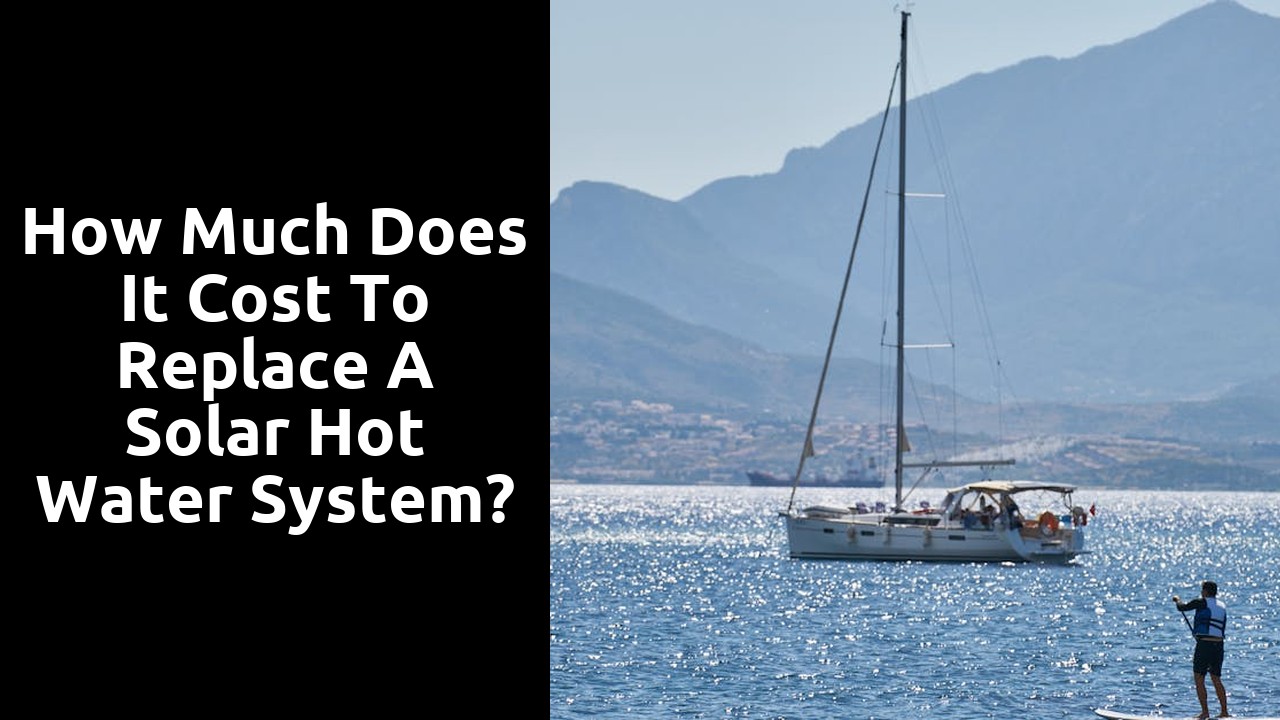
Table Of Contents
Rebates and Incentives for Solar Hot Water System Replacement
When considering the cost of replacing a solar hot water system, it is essential to explore the rebates and incentives available in Australia. Government rebate programs are often in place to encourage the uptake of renewable energy sources like solar hot water systems. These incentive schemes can significantly reduce the upfront costs associated with replacing an old system with a new, more efficient one. It is advisable for homeowners to research and take advantage of these rebates to make the switch to solar hot water more financially viable. Additionally, some government programs may require Solar Hot Water System Inspections to ensure the system meets specific standards for eligibility.
Apart from government rebates, there may also be other incentives offered by local councils or energy providers. These incentives could take the form of discounts, cashback offers, or other financial benefits that further offset the cost of replacing a solar hot water system. By exploring all available rebates and incentives, homeowners can make a more informed decision about investing in a new solar hot water system, not only for its environmental benefits but also for the potential cost savings in the long run.
Government Rebate Programs
Government rebate programs in Australia offer financial incentives to encourage homeowners to replace their solar hot water systems with more energy-efficient options. These programs aim to reduce the country's overall energy consumption and promote the use of renewable energy sources. Homeowners can apply for rebates when they upgrade their existing systems to newer, more efficient models. The rebates can help offset the initial cost of purchasing and installing a new solar hot water system.
One important requirement for qualifying for these rebate programs is ensuring that the replacement systems meet specific energy efficiency standards. Homeowners may be required to provide proof of purchase and installation, as well as undergo Solar Hot Water System Inspections to verify that the new system meets the necessary requirements. By participating in these rebate programs, homeowners not only benefit from reduced energy bills but also contribute to the overall sustainability efforts in Australia.
DIY vs Professional Installation
When it comes to replacing a solar hot water system, one of the key decisions to make is whether to opt for a do-it-yourself (DIY) installation or enlist the services of a professional. DIY installation can be appealing to those who are handy and looking to save on costs. However, it is essential to consider the complexity of the installation process and the potential risks involved. Installing a solar hot water system incorrectly can lead to inefficiencies, leaks, and even system failure, resulting in additional expenses for repairs or replacements.
On the other hand, hiring a professional for the installation of your solar hot water system provides the assurance of a job done correctly. Professionals have the expertise, experience, and tools necessary to ensure that the system is installed efficiently and safely. They can also offer valuable advice on the best placement for optimal energy efficiency and conduct thorough Solar Hot Water System Inspections to identify any potential issues before they escalate. While professional installation may come at a higher initial cost, it can ultimately save you money in the long run by preventing problems and ensuring the longevity of your system.
Pros and Cons of DIY Replacement
When considering whether to replace a solar hot water system through a do-it-yourself (DIY) approach, there are several pros and cons to take into account. One of the main advantages of opting for a DIY replacement is the potential cost savings. By undertaking the installation yourself, you may be able to avoid labour costs associated with hiring a professional installer. Additionally, if you are confident in your abilities and have experience with similar projects, DIY replacement can be a fulfilling and empowering task.
On the flip side, there are significant risks involved with a DIY replacement of a solar hot water system. Without the expertise and training of a professional installer, you may inadvertently make mistakes during the installation process, leading to costly repairs or even system malfunctions. Furthermore, DIY replacements may void any warranties associated with the solar hot water system, leaving you financially responsible for any future issues that may arise. To ensure the safety and efficiency of your system, it is recommended to weigh the pros and cons carefully before attempting a DIY replacement. Remember, regular Solar Hot Water System Inspections are crucial in maintaining the longevity and performance of your unit.
Maintenance Costs for Solar Hot Water Systems
Maintenance costs for solar hot water systems are an important consideration for homeowners looking to maximize the lifespan and efficiency of their system. Regular servicing is essential to ensure that the system is functioning optimally and to prevent potential issues from arising. Solar hot water system inspections should be scheduled at least once a year to check for any leaks, corrosion, or mechanical issues that could impact the system's performance.
In addition to routine inspections, homeowners should also budget for potential repair costs that may arise over the lifetime of the system. Repair expenses can vary depending on the complexity of the issue and whether parts need to be replaced. By staying proactive with maintenance and promptly addressing any issues that arise, homeowners can help extend the lifespan of their solar hot water system and minimize long-term costs.
Regular Servicing Charges
When it comes to maintaining a solar hot water system, regular servicing is essential to ensure its optimal performance and longevity. Typical costs for regular servicing charges can vary depending on the provider and the complexity of the system. It is recommended to schedule annual Solar Hot Water System Inspections to identify any potential issues early on and prevent costly repairs in the future.
During Solar Hot Water System Inspections, a qualified technician will inspect various components such as the collector, tank, pumps, and connections to ensure they are functioning correctly. They will also check for leaks, corrosion, and any signs of wear and tear that may impact the system's efficiency. By investing in regular servicing and maintenance, homeowners can extend the lifespan of their solar hot water system and maximise its energy-saving benefits.
FAQS
What factors can affect the cost of replacing a solar hot water system?
The cost of replacing a solar hot water system can be affected by various factors such as the type and size of the system, installation charges, any additional plumbing or electrical work required, and the location of your property.
Are there any rebates or incentives available for replacing a solar hot water system?
Yes, there are rebates and incentives available for replacing a solar hot water system in Australia. You may be eligible for government rebate programs or other financial incentives to help offset the cost of installation.
Is it cheaper to replace a solar hot water system with a DIY approach?
While replacing a solar hot water system with a do-it-yourself (DIY) approach may seem cost-effective, it is recommended to hire a professional installer. DIY replacement may lead to complications and void warranties, ultimately costing you more in the long run.
What are the maintenance costs associated with a solar hot water system replacement?
The maintenance costs for a solar hot water system replacement typically include regular servicing charges. It is important to factor in these ongoing maintenance costs to ensure the efficient operation of your system.
How can I find out more about government rebate programs for solar hot water system replacement?
To learn more about government rebate programs for solar hot water system replacement, you can visit the official websites of relevant government departments or contact local authorities for information on available incentives and financial assistance.
